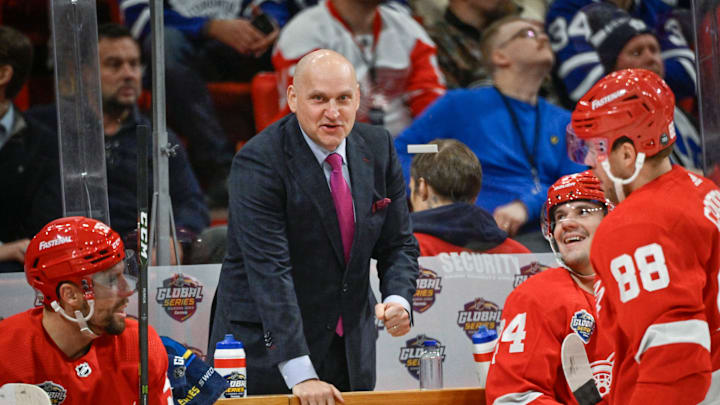OK, hardcore fans of the Detroit Red Wings, in which camp do you reside? Has their recent points mini streak (3-0-1) convinced you that this team has tightened up enough defensively to remain a playoff contender? Thumbs up or down?
Here's one for the thumbs-down camp. Yes, the Detroit Red Wings won all three games of their West Coast road trip that opened the calendar year. And, yes, they played better overall defensively and between the pipes, with netminder Alex Lyon performing solidly. But understand two of their wins came against the Anaheim Ducks and San Jose Sharks, among the NHL's weakest teams. The other came against the Los Angeles Kings, which, although formidable, have been inexplicably underperforming on home ice.
So that shouldn't erase the sour taste of a disturbing December when the Red Wings went 5-9-1 while allowing an average of more than four goals a game. A better indication of their defensive structure should be their 3-2 overtime loss Thursday night to the league's hottest team, the Edmonton Oilers.
Detroit needed Lyon to make 44 saves, nearly single-handedly shutting down two of the sport's most dynamic offensive players, Oilers Connor McDavid and Leon Draisaitl. The Red Wings generated scoring chances, but the Oilers limited them to 17 shots. Clearly, Detroit was fortunate to get a point.
Detroit Red Wings need to address the defensive deficiencies.
Contrary to some opinions, the issue is the Red Wings' overall defensive play. Far too often, there is little cohesion defensively and almost no awareness. It's as if, each shift, defensive responsibility is an afterthought and not a priority. Many fans and several in the media want the Red Wings to deal for a dependable defenseman; shore up the blue line, they say. But the issue is deeper than that.
Overall, defensive play is a product of communication and determination from both forwards and defensemen. There are concepts that players learn and, hopefully, embrace as they rise through their many levels of competition—for example, recognizing when a teammate needs help when to collapse at the goal, and which opponent is most dangerous. Angles, support, lanes, backcheck ... the list can be long and difficult. Mostly, though, team defense is a commitment. Clearly, this group of Red Wings has yet to commit to or embrace the concepts.
Red Wings coach Derek Lalonde seems to understand his team's defensive shortcomings. But he also avoids criticizing individual players publicly, right? However, with 139 goals allowed in 41 games, Detroit ranks in the bottom third of the league. Detroit cannot hide from that number.
In December, after one of the Red Wings' woeful efforts, Lalonde mentioned how too many of his forwards were making wide turns when approaching opposing puck-carriers instead of being more fundamentally sound by stopping and challenging the play. But he's also made far too much of the Red Wings' ordinary play in goal. Like so many fans, it seems Lalonde is taking the easy way out; he places far too much blame on the goalies instead of holding other players more accountable.
Mini-point streak aside, the coach is still under some pressure here. The question is, can he get his players to respond defensively, game in, game out? Doubtful, and here's why:
In most sports, rosters are a mix of thoroughbreds and plow horses. The thoroughbreds are the offensive forces, the scorers. Plow horses do the dirty work. The way Detroit's forward group is put together, there are too many thoroughbreds and too many players who are only effective if they score. Getting the thoroughbreds to do more dirty work, for a coach, can be an impossible task. Maybe a trade in the next few months can change the complexion of this group, but the biggest change needs to be with the coaching staff.
After Thursday night's OT loss to Edmonton, Lalonde addressed the recent play of Lyon, who is 4-1-1 since returning from injury on Dec. 29.
"Him coming back (from injury) is exactly the time we started eating some points," Lalonde said. "We're 4-1-1 since he's come back off injury, so, of course, I think our guys feed off him."
Again, the focus was on goaltending and not the play in front of the player with the big pads and big stick. But we've seen this before in recent years. Once a Detroit netminder stops standing on his head, the losses start to pile up, right?
So that's the challenge. Lalonde should realize the puck's on his stick here. It's his job to get players to defend better, to pull together more cohesively. If he can't get a thoroughbred to do a bit more dirty work, then maybe it's time to sit some thoroughbreds.
